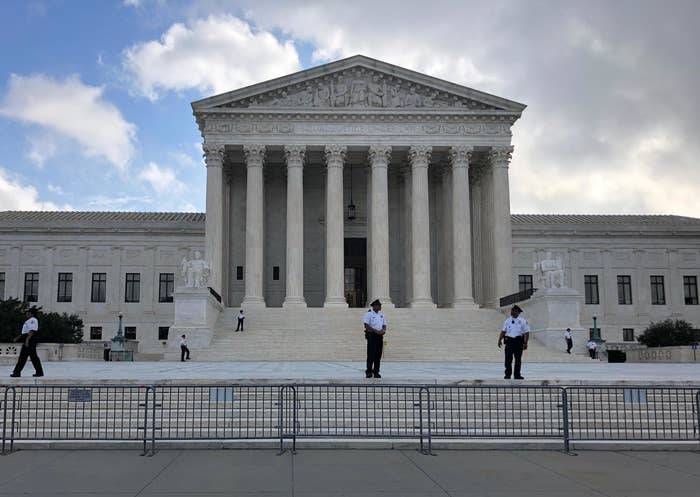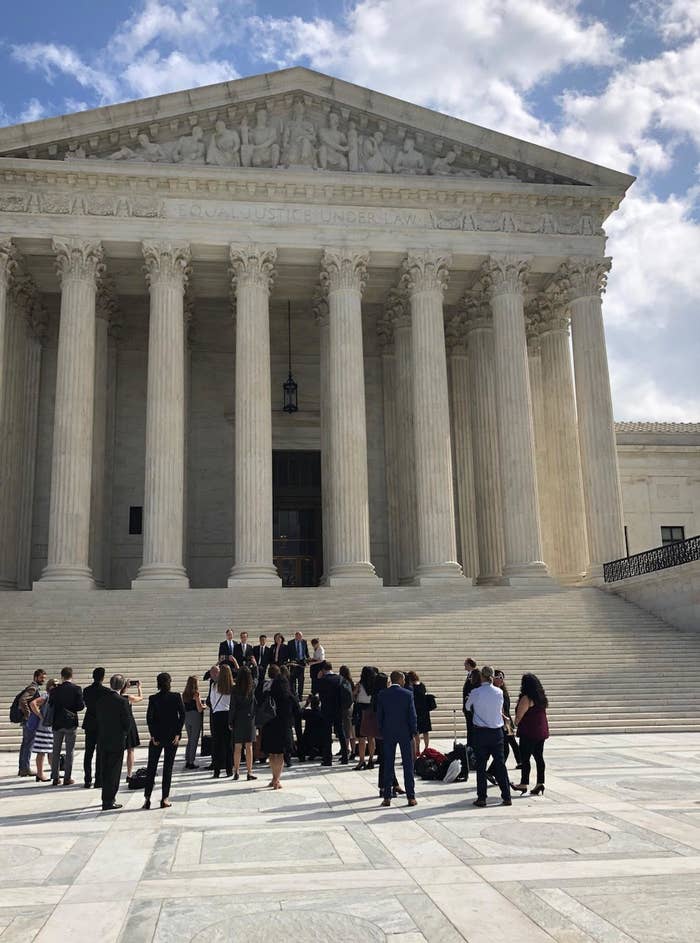
In a case that the ACLU says could affect thousands of immigrants, the Supreme Court on Wednesday considered when the government has the right to detain a class of immigrants without a bail hearing.
Under a 1996 law, the federal government is allowed to detain immigrants whose criminal conviction or involvement in terrorism-related activities would make them inadmissible or deportable. The law says the government “shall” take any of those immigrants into custody “when the alien is released” from criminal custody. The question before the justices is: What happens if the Department of Homeland Security doesn’t do so immediately?
The arguments on Wednesday focused on the technicalities of the 1996 law, rules of grammar, and timelines — not the sort of fiery rhetoric usually favored by President Donald Trump or Attorney General Jeff Sessions when talking about immigrants.
And while the case was granted to resolve the question of whether the statute still applied if DHS does not act immediately — whether there is any time restriction — the arguments shifted to a question of what limitation would be reasonable.
After a back-and-forth with Justice Sonia Sotomayor and a question from Justice Ruth Bader Ginsburg, Justice Neil Gorsuch spoke up early in the Wednesday arguments, asking, “[D]oes the government have any view about if ever the obligation [to take an immigrant into custody] lapses? Could it be 30 years? … Thirty years, and the government was aware of him the entire time and chose not to act. … Is there any limit on the government’s power?”
The government lawyer, Zachary Tripp from the Solicitor General’s Office, said the law created “a continuing obligation” that “does not lapse.”
Later, when Justice Stephen Breyer raised a similar question and Tripp began answering about when certain underlying crimes would be covered under the detention provision, Gorsuch interjected, said that back-and-forth was “quibbling,” and redirected Tripp to the larger question: “Justice Breyer’s question is my question, and I really wish you’d answer it.”
Breyer then stated his question more directly: “Is the government’s position that this paragraph, which says shall be arrested upon release, applies to a person who has been released 50 years before?”
Tripp, not giving in at all, said the government’s position is “absolutely that this applies regardless of the time” that’s passed.

By the time the ACLU lawyer, Cecillia Wang, took her turn at the podium to represent the view of the immigrant class in the case, it was clear the debate was a changed one.
Fighting to affirm the US Court of Appeals for the 9th Circuit’s decision that DHS must act with “a reasonable degree of immediacy,” Wang was pressing the court to adopt a rule that DHS must take custody of the person in question within a day.
The changed focus of the arguments was summed up when Chief Justice John Roberts spoke up after Wang had been taking a series of questions from Justices Samuel Alito and Breyer about immediacy and reasonableness.
“[T]here’s a difference between ‘reasonable degree of immediacy’ and ‘reasonable time,’” the chief justice said. “[W]hich are you arguing for, ‘reasonable degree of immediacy,’ which strikes me as a very short time, or a ‘reasonable time’? ‘Reasonable time’ would depend, for example, on the resources that are available to the Department of Homeland Security.”
Wang responded that “reasonable” — as used by the 9th Circuit — was focused on the timing element and not “whether the government was making reasonable efforts.”
Pressed to give a time, Wang said “the same day would be fine,” citing a Board of Immigration Appeals decision asserting that 48 hours “is not within the scope of the ‘when the alien is released’ phrase” in the law.
While members of the court, including Breyer, seemed skeptical of that argument, the argument had shifted to the ACLU’s terrain — a debate of how much of a limit should be placed on the government.
When the government’s lawyer returned to the podium, the shift became clearer still. Even Justice Brett Kavanaugh — who had questioned Wang’s position and noted during her time that Congress’s aim with the law was “harshness” — acknowledged the shift, mentioning Breyer's discussion of reasonableness and asking Tripp what the government thought a “reasonable amount” of time would be.
Tripp responded that any time limit would be “really profoundly problematic,” prompting another attempt by Kavanaugh to get a more precise answer — but no clear answer from the government.
The justices took the case under advisement and a decision is expected by June — but the court sets no timeline for when it release decisions.
